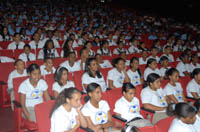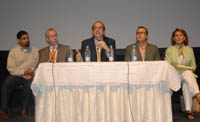A Film That Invokes the Vocation of Service
Santo Domingo,
November 19, 2008
A nation. A town. Malawi. Nevertheless, the team that produced
the documentary I Am Because We Are left these borders
with a product that gives meaning to these words.
This film is about the African continent and its challenge to
stop the spread of HIV/AIDS in a region where some 2.5 million
children suffer from the disease.
 In the documentary that showed in the main hall of the
National Theater, experts explained that Malawi is affected by
several killer diseases such as malaria and typhus.
Nevertheless, the fastest growing and deadliest illness in
this country is HIV/AIDS because of the troubling fact that
the country is not sufficiently open to talk about the
disease. The silence and denial have made and maintain the
disease an enigma. In the documentary that showed in the main hall of the
National Theater, experts explained that Malawi is affected by
several killer diseases such as malaria and typhus.
Nevertheless, the fastest growing and deadliest illness in
this country is HIV/AIDS because of the troubling fact that
the country is not sufficiently open to talk about the
disease. The silence and denial have made and maintain the
disease an enigma.
Fred is one of millions of children in Malawi who lives with
the disease and the hope that God will not take his life, as
he did with his parents, leaving him to join the ranks of the
“many orphans” that live in his village.
Former US President Bill Clinton, who appeared in the
documentary, explained that the most viable solution to the
problem is to empower the citizens in their role as social
individuals so that they themselves will build the necessary
structures for their own development.
It is in this very precarious situation when a mother has to
embalm her 3-year-old son and place his remains in a common
niche that hope is transformed into something unattainable and
resignation of one´s fate takes over one´s entire life. A
vision, therefore, is necessary - a sign of change which is
the only solution offered by the experts in the documentary:
“We change or we die,” because in Malawi, there is still
strength.
Nathan Rissman, Director, and Madonna, writer and producer of
the documentary seek to show that necessity can turn us into
agents for change even in the face of this most horrible
situation. The filmmakers do this through the stories of eight
children who yearn for better lives and put every bit of
themselves into making this happen, or at least to meet one of
the goals they´ve set out for themselves.
Panel of Experts
 |
|
Gustavo Rojas, Germán Agudelo, Patrick Donnelly |
Following the showing of the film, a panel discussion was held
with Gustavo Rojas, Director of the President´s Advisory
Council on HIV/AIDS (PACHA); Germán Agudelo, representative of
the NGO Population Services International (PSI); and Patrick
Donnelly, Attorney from Crowell & Moring LLP.
Gustavo Rojas stressed that in order to contain the AIDS
epidemic “we can´t expect individual solutions to collective
problems,” because of the rapid spread of this illness, it
cannot be analyzed from this perspective, he said.
Germán Agudelo added that while there may be more awareness
among young people about the contagious nature of HIV/AIDS,
there is a major change in the reduction of those affected by
AIDS per year. He noted, however, that “a situation similar to
the film can be seen in the poor neighborhoods of the
Dominican Republic.
The last speaker, Patrick Donnelly, using updated data, spoke
about the impact HIV/AIDS is having on Africa. He said that
some 22 million people are now living with AIDS in Africa, of
which 1.6 million die every year, “which means that some 250
people died during the time it took to watch the documentary
we just saw,” emphasizing that these deaths are provoked
mainly by the fear of discrimination.
|








